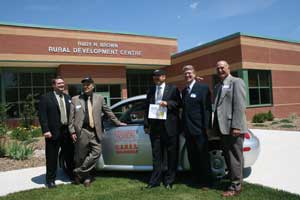Researchers build farm-scale crushing, biodiesel facility

January 1, 2009
BY Ryan C. Christiansen
The Centre for Agricultural Renewable Energy and Sustainability at the University of Guelph's Ridgetown Campus in Guelph, Ontario, is working with local farmers to build a model farm-scale oilseed processing and biodiesel production plant on campus. The facility is intended to demonstrate how soybean and pork producers might work together to produce biodiesel and feed hogs without having to leave the farm. The project is being funded through a CAN$938,000 (US$734,000) grant from Agriculture and Agri-Food Canada's
Advancing Canadian Agriculture and Agri-Food program, part of Ontario's Agricultural Adaptation Council.
According to Art Schaafsma, director of the Ridgetown Campus, the facility will help researchers to understand the correct scale for an on-farm biodiesel operation, including how many acres of oilseed crops would be needed to supply feedstocks for biodiesel production and how many hogs would be needed to consume the resulting meal. He said the facility is initially being built around 15 to 20 farmers and 20,000 acres of soybeans, but the first batch of biodiesel was to be produced from waste vegetable oil "just to get some cash flow going." The plant will produce approximately 800,000 liters (210,000 gallons) of biodiesel annually, starting production at 10 percent to 20 percent capacity by the end of 2008 and increasing to 90 percent capacity by 2012.
Schaafsma said researchers ultimately want to know how much farmers might gain by crushing oilseeds, and making meal and biodiesel on the farm instead of transporting the oilseeds to be sold elsewhere, or purchasing meal and biodiesel elsewhere and transporting it to the farm. Furthermore, the farm-scale, closed-loop model of farming has its detractors. "It doesn't garner a lot of favor with the folks that argue that you have to have huge scale to be profitable," he said. "We're somewhat going against the stream on this.
I haven't seen any published data to say that it won't work."
Schaafsma said the glycerin byproduct will also be used, possibly in an anaerobic digester to produce methane gas for heat or electricity, or it may be sold as feed. He said oilseed crushing is energy-intensive but produces a lot of waste heat, as well, which might be used by an on-site greenhouse. The oilseed hulls might also be recycled.
When the biodiesel facility is operational, the site will be used to demonstrate the technology and to educate students. Students will help to run the facility, Schaafsma said.
Advancing Canadian Agriculture and Agri-Food program, part of Ontario's Agricultural Adaptation Council.
According to Art Schaafsma, director of the Ridgetown Campus, the facility will help researchers to understand the correct scale for an on-farm biodiesel operation, including how many acres of oilseed crops would be needed to supply feedstocks for biodiesel production and how many hogs would be needed to consume the resulting meal. He said the facility is initially being built around 15 to 20 farmers and 20,000 acres of soybeans, but the first batch of biodiesel was to be produced from waste vegetable oil "just to get some cash flow going." The plant will produce approximately 800,000 liters (210,000 gallons) of biodiesel annually, starting production at 10 percent to 20 percent capacity by the end of 2008 and increasing to 90 percent capacity by 2012.
Schaafsma said researchers ultimately want to know how much farmers might gain by crushing oilseeds, and making meal and biodiesel on the farm instead of transporting the oilseeds to be sold elsewhere, or purchasing meal and biodiesel elsewhere and transporting it to the farm. Furthermore, the farm-scale, closed-loop model of farming has its detractors. "It doesn't garner a lot of favor with the folks that argue that you have to have huge scale to be profitable," he said. "We're somewhat going against the stream on this.
I haven't seen any published data to say that it won't work."
Schaafsma said the glycerin byproduct will also be used, possibly in an anaerobic digester to produce methane gas for heat or electricity, or it may be sold as feed. He said oilseed crushing is energy-intensive but produces a lot of waste heat, as well, which might be used by an on-site greenhouse. The oilseed hulls might also be recycled.
When the biodiesel facility is operational, the site will be used to demonstrate the technology and to educate students. Students will help to run the facility, Schaafsma said.
Advertisement
Advertisement
Upcoming Events





